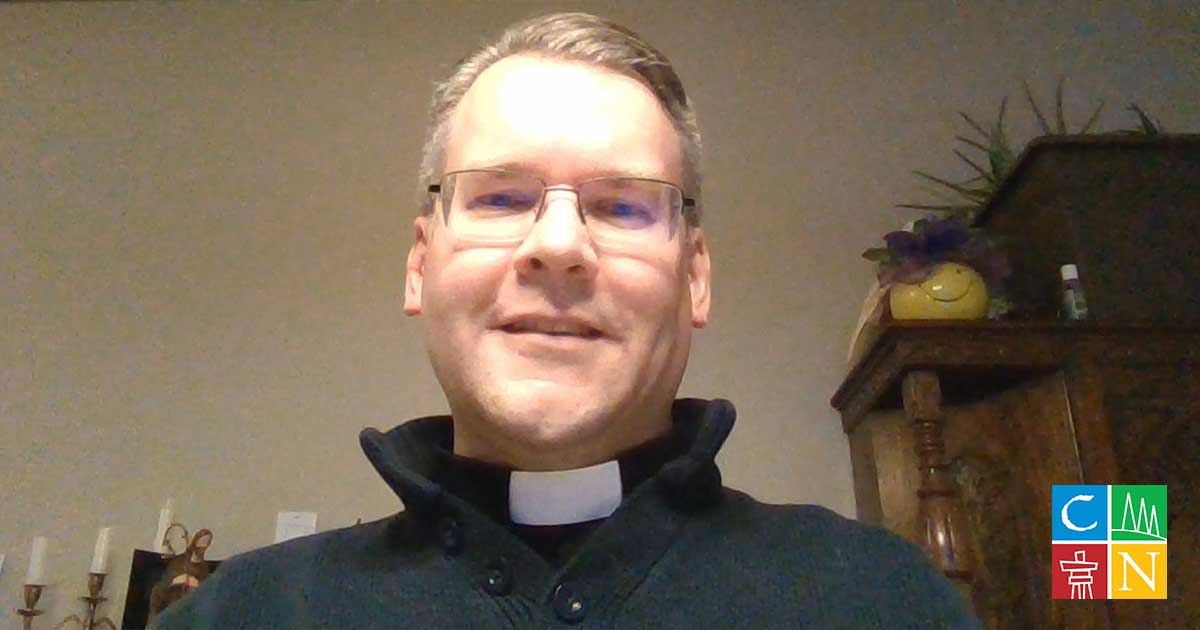from the Summer 2020 edition of Contact
A conversation with Bishop-elect Lincoln McKoen of the Territory of the People
By Matt Gardner for Contact
On Jan. 25, Lincoln McKoen was elected the first bishop of the Territory of the People on the fourth ballot. Though he has not yet been consecrated due to social distancing measures in response to the COVID-19 pandemic, the bishop-elect has been appointed administrator of the territory and began serving in this position on May 1. A consecration date will be determined based on social distancing guidelines from the provincial government and in consultation with Archbishop and Metropolitan Melissa Skelton.
Born and raised in Ontario, McKoen studied political science at Dalhousie University, where he was baptized into the Anglican Church. He received his master of divinity from Trinity College in 2002 and subsequently served as a catechist. In 2003 McKoen was ordained as a deacon in the diocese of Niagara. The same year he was ordained as a priest and began serving at various Ontario congregations. In 2010, he moved to British Columbia and served as an incumbent in Alert Bay. From 2018 until his election as bishop, he served as incumbent at St. Peter, Campbell River, and archdeacon of Nimpkish Deanery.
Contact spoke with Bishop-elect McKoen on May 12 to learn of developments in his diocese and his plans going forward. This interview has been edited for brevity.
Q. What is your current status as bishop-elect?
A. I’ve been appointed administrator of the territory. What that means essentially is that I have all administrative powers like I would if I was consecrated. The only things I cannot do are any liturgical episcopal functions, like ordinations or confirmations. Otherwise, I have the full legal authority [of bishop].
Q. What’s been occupying your attention since the episcopal election?
A. Basically I had to finish up my parish ministry, because I still had to give my three-month notice to the diocese of British Columbia. I started as administrator on May 1, so for the past 12 days, I have been basically bringing myself up to speed and getting involved with different administrative functions of the territory. I’ve been participating in different Zoom calls, online worship, coffee hours, these sort of things, in various parishes within the territory.
Q. What are your current priorities?
A. The immediate priority to help the territory navigate through all the different things with COVID-19. That’s in conjunction [with] waiting for the province to say what we can do when, [and] helping parishes and clergy navigate all of this as well. They’re doing a beautiful and phenomenal job. Bishop Barbara Andrews, my predecessor, had done a lot of that work ahead of time before I arrived. So I’m just continuing what she had set up, helping the territory and the parishes navigate the financial concerns that every diocese is going through in Canada.
Because the province of British Columbia has released a very rough reopening plan for the next four to six months, [we’re] planning ahead on what that may look like, providing numbers [of infection] continue to stay stable or go down. Of course, that’s all in conjunction with the province. Nobody knows from day to day what’s going to happen next.
Q. How are you handling episcopal ministry in the time of COVID-19?
A. It’s a very unique challenge. Thankfully, we’re blessed with the technology that we [have]. Would I love to be able to get out and visit parishes? Of course I would. But I’m able to use the technology at hand to at least get to know the clergy. It’s no substitute for one-on-one personal conversations and meetings, but it is getting there.
Q. What are your plans for the near future in the territory?
A. We have our bi-annual EQUIP conference in the fall, which is a ministry conference for the whole territory. We’ve actually just finished that planning session today.
Q. Your past ministry has included work in reconciliation and catechesis. Is there a plan to take any action in those areas as bishop?
A. Yes, there is. For any reconciliation ministry, I would have to get to know the nations within the territory. That’s personal, one-on-one trust building and relationship building. Reconciliation is not imposed. Reconciliation is built from the ground up. That involves getting to know the people, the territories, their lands, their customs, their culture, their languages, their traditions—what makes the nations who they are.
Once that happens, which takes many years of work, then we can talk about what reconciliation looks like to the nations—not what it looks like to the church, but what it means to them and how we continue that process. It’s a process that’ll continue long after I am dead and buried. It’s a multi-generational process, and that depends on how the nations work and what the nations are looking for and seeking in a relationship with the church.
Education and catechesis: a lot of that comes with the church reclaiming its mission as who it is as the church. That’s a unique, organic process to each parish. The church’s mission, of course, is to share the love of Jesus Christ. But for us as the church, [it is] to reclaim that for ourselves internally in how we live and work and deal with each other—including learning from the history of the church, both good and bad, to help us all be better followers of Jesus Christ in our individual walks.
Interested in keeping up-to-date on news, opinion, events and resources from the Anglican Church of Canada? Sign up for our email alerts .

